Nadh and carbon dioxide - Study guides, Class notes & Summaries
Looking for the best study guides, study notes and summaries about Nadh and carbon dioxide? On this page you'll find 815 study documents about Nadh and carbon dioxide.
Page 3 out of 815 results
Sort by

-
BIO 441A EXAM 3 STUDY GUIDE WITH COMPLETE SOLUTION.
- Exam (elaborations) • 20 pages • 2024
-
- $12.99
- + learn more
BIO 441A EXAM 3 STUDY GUIDE WITH COMPLETE SOLUTION. LECTURE ONE - METABOLISM INTRODUCTION ● Autotrophs synthesize all their own cellular constituents from simple molecules ● Heterotrophs obtain energy through oxidation of organic compounds and therefore rely on autotrophs ● Metabolism involves many reactions such as ○ Glycolysis/gluconeogenesis ○ The citric acid cycle ○ Oxidative phosphorylation ● Catabolism is the degradation of biomolecules ○ Energy rich nutrients are...
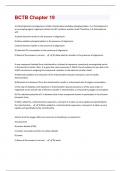
-
BCTB Chapter 19 Questions And Answers Graded A+
- Exam (elaborations) • 20 pages • 2024
- Available in package deal
-
- $7.99
- + learn more
2,4-Dinitrophenol and oligomycin inhibit mitochondrial oxidative phosphorylation. 2,4- Dinitrophenol is an uncoupling agent; oligomycin blocks the ATP synthesis reaction itself. Therefore, 2,4-dinitrophenol will: A) allow electron transfer in the presence of oligomycin. B) allow oxidative phosphorylation in the presence of oligomycin. C) block electron transfer in the presence of oligomycin. D) diminish O2 consumption in the presence of oligomycin. E) None of the answers is correct. - A) ...

-
BIOD 171/ 171 PORTAGE LEARNING (2 VERSIONS) FINAL EXAM WITH VERIFIED QUESTIONS AND ANSWERS
- Exam (elaborations) • 52 pages • 2024
- Available in package deal
-
- $30.99
- + learn more
BIOD 171/ 171 PORTAGE LEARNING (2 VERSIONS) FINAL EXAM WITH VERIFIED QUESTIONS AND ANSWERS VERSION 1 • Define catabolism. It is a process that allows larger molecules to be broken down into useful energy sources. • Upon cellular injury, which metabolic process is involved during the growth and repair phases of the cell? The anabolic process because it is involved with building up small complexes into larger complexes. • True or False: Metabolism is a controlled set of biochemi...
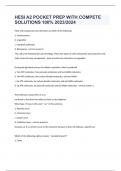
-
HESI A2 POCKET PREP WITH COMPETE SOLUTIONS 100% 2023/2024
- Exam (elaborations) • 23 pages • 2023
- Available in package deal
-
- $12.99
- + learn more
HESI A2 POCKET PREP WITH COMPETE SOLUTIONS 100% 2023/2024 Most cell components are referred to as which of the following a. chromosomes b. organelles c. metabolic pathways d. Ribosomes - correct answer b The cell is the fundamental unit of biology. There two types of cells: prokaryotic and eukaryotic cells. Cells consist of many components , most of which are referred to as organelles During the glycolysis process of cellular respiration, what is produced a. Two ATP molecules, ...
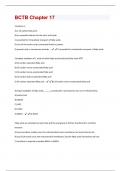
-
BCTB Chapter 17 Questions And Answers With Latest Quiz
- Exam (elaborations) • 24 pages • 2024
- Available in package deal
-
- $7.99
- + learn more
Carnitine is: A) a 15-carbon fatty acid. B) an essential cofactor for the citric acid cycle. C) essential for intracellular transport of fatty acids. D) one of the amino acids commonly found in protein. E) present only in carnivorous animals. - C) essential for intracellular transport of fatty acids. Complete oxidation of 1 mole of which fatty acid would yield the most ATP? A) 16-carbon saturated fatty acid B) 18-carbon mono-unsaturated fatty acid C) 16-carbon mono-unsaturated fatty aci...

-
Bio 104 Quiz 7 Latest Update Graded A+
- Exam (elaborations) • 6 pages • 2024
-
- $8.99
- + learn more
Bio 104 Quiz 7 Latest Update Graded A+ What is the name of the protein complex that helps transport electrons across the inner mitochondrial membrane? Electron transport chain. What is the purpose of fermentation in cells? To regenerate NAD+ for glycolysis when oxygen is scarce. What are the two types of fermentation and their main byproducts? Lactic acid fermentation (produces lactic acid) and alcoholic fermentation (produces ethanol and carbon dioxide). What is the main d...

-
BIO 101 FINAL EXAM QUESTIONS AND ANSWERS 2022
- Exam (elaborations) • 80 pages • 2022
-
- $8.49
- 1x sold
- + learn more
Bio Exam One 1. The presence of a cell wall and cell membrane, but the absence of cellular organelles would be a description of which of the following classes of cells? a. prokaryotic cells b. eukaryotic cells 2. Which one of the following is a function of a protein? a. serves as an enzyme and speeds up a chemical reaction b. stores genetic material and enables its transmission to the next generation c. provides energy for a muscle contraction d. is a primary structural component of DNA 3. Whic...
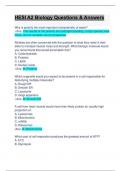
-
HESI A2 Biology: Questions & Answers: A+ Score Guide Solution
- Exam (elaborations) • 24 pages • 2023
- Available in package deal
-
- $7.99
- + learn more
Why is polarity the most important characteristic of water? (Ans- The results of the polarity are hydrogen bonding, a high specific heat value, and its versatile solvent properties. Athletes are often concerned with the question of what they need in their diets to increase muscle mass and strength. What biologic molecule would you recommend that would accomplish this? A. Carbohydrates B. Proteins C. Lipids D. Nucleic acids (Ans- B. Proteins Which organelle would you expect to be pr...
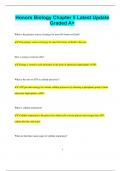
-
Honors Biology Chapter 5 Latest Update Graded A+
- Exam (elaborations) • 10 pages • 2024
- Available in package deal
-
- $9.99
- + learn more
Honors Biology Chapter 5 Latest Update Graded A+ What is the primary source of energy for most life forms on Earth? The primary source of energy for most life forms on Earth is the sun. How is energy stored in cells? Energy is stored in cells primarily in the form of adenosine triphosphate (ATP). What is the role of ATP in cellular processes? ATP provides energy for various cellular processes by releasing a phosphate group to form adenosine diphosphate (ADP). What is cellul...
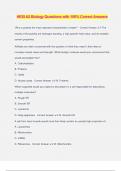
-
HESI A2 Biology Questions with 100% Correct Answers
- Exam (elaborations) • 29 pages • 2024
- Available in package deal
-
- $12.49
- + learn more
HESI A2 Biology Questions with 100% Correct Answers Why is polarity the most important characteristic of water? - Correct Answer ️️ -The results of the polarity are hydrogen bonding, a high specific heat value, and its versatile solvent properties. Athletes are often concerned with the question of what they need in their diets to increase muscle mass and strength. What biologic molecule would you recommend that would accomplish this? A. Carbohydrates B. Proteins C. Lipids D. Nuclei...

Did you know that on average a seller on Stuvia earns $82 per month selling study resources? Hmm, hint, hint. Discover all about earning on Stuvia


